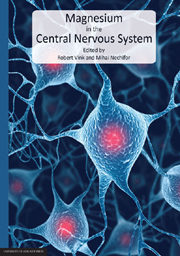Preface
Published online by Cambridge University Press: 05 June 2012
Summary
The brain is the most complex organ in our body. Indeed, it is perhaps the most complex structure we have ever encountered in nature. Both structurally and functionally, there are many peculiarities that differentiate the brain from all other organs. The brain is our connection to the world around us and by governing nervous system and higher function, any disturbance induces severe neurological and psychiatric disorders that can have a devastating effect on quality of life.
Our understanding of the physiology and biochemistry of the brain has improved dramatically in the last two decades. In particular, the critical role of cations, including magnesium, has become evident, even if incompletely understood at a mechanistic level. The exact role and regulation of magnesium, in particular, remains elusive, largely because intracellular levels are so difficult to routinely quantify. Nonetheless, the importance of magnesium to normal central nervous system activity is self-evident given the complicated homeostatic mechanisms that maintain the concentration of this cation within strict limits essential for normal physiology and metabolism. There is also considerable accumulating evidence to suggest alterations to some brain functions in both normal and pathological conditions may be linked to alterations in local magnesium concentration.
This book, containing chapters written by some of the foremost experts in the field of magnesium research, brings together the latest in experimental and clinical magnesium research as it relates to the central nervous system.
- Type
- Chapter
- Information
- Magnesium in the Central Nervous System , pp. viiiPublisher: The University of Adelaide PressPrint publication year: 2011

